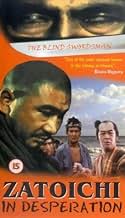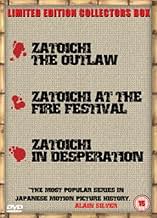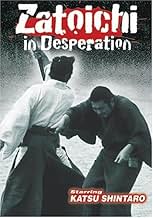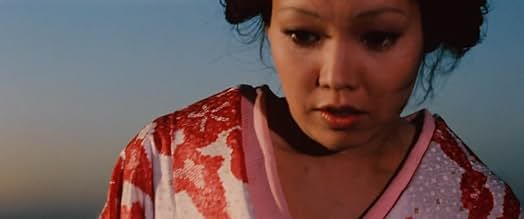AVALIAÇÃO DA IMDb
6,8/10
1,2 mil
SUA AVALIAÇÃO
Adicionar um enredo no seu idiomaAfter accidentally causing an old lady's death, Zatoichi seeks out her daughter to atone for the tragedy, consequently getting into all sorts of trouble.After accidentally causing an old lady's death, Zatoichi seeks out her daughter to atone for the tragedy, consequently getting into all sorts of trouble.After accidentally causing an old lady's death, Zatoichi seeks out her daughter to atone for the tragedy, consequently getting into all sorts of trouble.
- Direção
- Roteiristas
- Artistas
- Direção
- Roteiristas
- Elenco e equipe completos
- Produção, bilheteria e muito mais no IMDbPro
Avaliações em destaque
I am new to the Zatoichi film series; this was the first film in the series I have seen, after buying a couple of seasons of the TV series and enjoying them. If the rest of the series is as good as this one then I can see I am in for a virtual lifetime of great Zatoichi films - when I can find them in video stores!
"Zatoichi in Desperation" is darker and as another reviewer said, more "heavy handed" than the TV episodes I have seen. The characters - the prostitute given a tentative freedom, the fishermen from the village harassed by the local yakuza gang, the 14-year-old girl about to be forced to work in the brothel and her little brother - are memorable and tragic. Their lives become intertwined with Zatoichi's by a twist of fate - an old woman who accidentally falls from a bridge, and Zatoichi's guilt resulting over it.
This intertwining of relationships, Zatoichi's humbleness despite his master swordsmanship, and the great photography is what makes the film (and the Zatoichi series!) special.
"Zatoichi in Desperation" is darker and as another reviewer said, more "heavy handed" than the TV episodes I have seen. The characters - the prostitute given a tentative freedom, the fishermen from the village harassed by the local yakuza gang, the 14-year-old girl about to be forced to work in the brothel and her little brother - are memorable and tragic. Their lives become intertwined with Zatoichi's by a twist of fate - an old woman who accidentally falls from a bridge, and Zatoichi's guilt resulting over it.
This intertwining of relationships, Zatoichi's humbleness despite his master swordsmanship, and the great photography is what makes the film (and the Zatoichi series!) special.
I have not seen more than five of the classic (and undeniably classy) Zatoichi samurai films, but this is surely the best, cinematographically, so far. It;s hard to believe this was shot in Eastman Color, a kind of poor second to Technicolor (and with far less durability; either the negative was especially preserved, or digital restoration was performed by a true expert; but in any event, this film is absolutely gorgeous to look at.
The story is dark, as others have noted; but the Zatoichi series, like most of the sword-fight genre series films to come out of Japan, is pretty heavy-handed stuff; the Japanese seem to take this sort of thing very seriously. Yet there is no doubt Zatoichi "24" stands out as exceptional, from both the series and its genre. The reason, I think, is its almost total sense of social dislocation; Zatoichi is treated by the other characters as somehow less than human, and his determination to fight at the end somewhat more than human, and so he comes across as something other than human; but the other humans of the film come across as rather poor representatives of the species. I should note that there is very little dialog in this film, particularly at the most dramatic moments, which heightens our sense that we are watching some tragedy from another reality.
The question here is, has director/star Katsu pushed his character to such an extreme that he is no longer representative of his genre, but somehow an independent dramatic entity, a "grade-A film", as might be enjoyed by those who disdain genre-films? well, I suggest this film to such viewers, as the "one chambara (Japanese sword-fight)film to see". But in any event, it is an exceptional, and troubling, cinema experience for anyone.
The story is dark, as others have noted; but the Zatoichi series, like most of the sword-fight genre series films to come out of Japan, is pretty heavy-handed stuff; the Japanese seem to take this sort of thing very seriously. Yet there is no doubt Zatoichi "24" stands out as exceptional, from both the series and its genre. The reason, I think, is its almost total sense of social dislocation; Zatoichi is treated by the other characters as somehow less than human, and his determination to fight at the end somewhat more than human, and so he comes across as something other than human; but the other humans of the film come across as rather poor representatives of the species. I should note that there is very little dialog in this film, particularly at the most dramatic moments, which heightens our sense that we are watching some tragedy from another reality.
The question here is, has director/star Katsu pushed his character to such an extreme that he is no longer representative of his genre, but somehow an independent dramatic entity, a "grade-A film", as might be enjoyed by those who disdain genre-films? well, I suggest this film to such viewers, as the "one chambara (Japanese sword-fight)film to see". But in any event, it is an exceptional, and troubling, cinema experience for anyone.
Katsu Productions was at a high level of output at this time. Katsu was producing the Zatoichi series, the Lone Wolf series, the Hanzo the Razor trilogy, the Mute Samurai television series and the Lone Wolf television series. All within a span of two years. In addition to acting in several of these efforts (of course) he also took the director's chair on several occasions. This man had a lot of energy.
While sometimes actors who take the helm show a lack of concern with the visuals preferring to focus on the performances, Katsu is an exception. The visual style here is unlike any other Zatoichi I've seen and in fact unlike most other chambara films. Everything is shot in deep focus with moody lighting and stark saturated colors. The style is somber and depressing. The next (and last in the series) Zatoichi film is back to the standard look. If you like this film I would suggest looking into Katsu's Oshi Samurai series which continues the atmosphere.
One of the best Zatoichi films but not similar to the others. Recommended but prepare for a somber experience.
While sometimes actors who take the helm show a lack of concern with the visuals preferring to focus on the performances, Katsu is an exception. The visual style here is unlike any other Zatoichi I've seen and in fact unlike most other chambara films. Everything is shot in deep focus with moody lighting and stark saturated colors. The style is somber and depressing. The next (and last in the series) Zatoichi film is back to the standard look. If you like this film I would suggest looking into Katsu's Oshi Samurai series which continues the atmosphere.
One of the best Zatoichi films but not similar to the others. Recommended but prepare for a somber experience.
This is the best one, number 24. Ichi realizes that he is not a hero, is making everyone's lives ultimately more violent and difficult than it would have without his existence. He is physically punished for this and still dispatches 20 dudes without using his hands.
If you don't like mean people, you know, actually effective villains, this one might make your little sensitivities buzz. The moral philosophy Katsu evaluates is artful and considerate. This is a brutal, dark, and ballsy entry.
If you don't like mean people, you know, actually effective villains, this one might make your little sensitivities buzz. The moral philosophy Katsu evaluates is artful and considerate. This is a brutal, dark, and ballsy entry.
I've seen 23 of the 26 films in the series (not including the Kitano) and this is by far the hardest to watch. It is less about Zatoichi and more about the cruelty and hardship of living in poverty in a fishing village in Edo era Japan. The film dwells very much upon the secondary characters as ends unto themselves and not just as elements in a story setting up a problem which Zatoichi will eventually resolve. Zatoichi acts as you would expect him to but he is overwhelmed by the misery and circumstances in a way that is unique in the series. Watch it by all means, but not with a light heart. I found myself also overwhelmed by the misery depicted in the film. It is unsettling.
Você sabia?
- CuriosidadesOnly film in the original series directed by Zatoichi himself, Shintarô Katsu. He would go on to direct one more, Zatoichi: A Escuridão é sua Aliada (1989).
- Citações
Boss Mangoro Kagiya: Please enjoy watching as Zatoichi meets his end.
- ConexõesFollowed by Mang jian xue di zi (1973)
Principais escolhas
Faça login para avaliar e ver a lista de recomendações personalizadas
- How long is Zatoichi in Desperation?Fornecido pela Alexa
Detalhes
- Data de lançamento
- País de origem
- Idioma
- Também conhecido como
- Zatoichi in Desperation
- Empresas de produção
- Consulte mais créditos da empresa na IMDbPro
- Tempo de duração1 hora 35 minutos
- Mixagem de som
- Proporção
- 2.35 : 1
Contribua para esta página
Sugerir uma alteração ou adicionar conteúdo ausente

Principal brecha
By what name was A Última Cilada (1972) officially released in India in English?
Responda





























